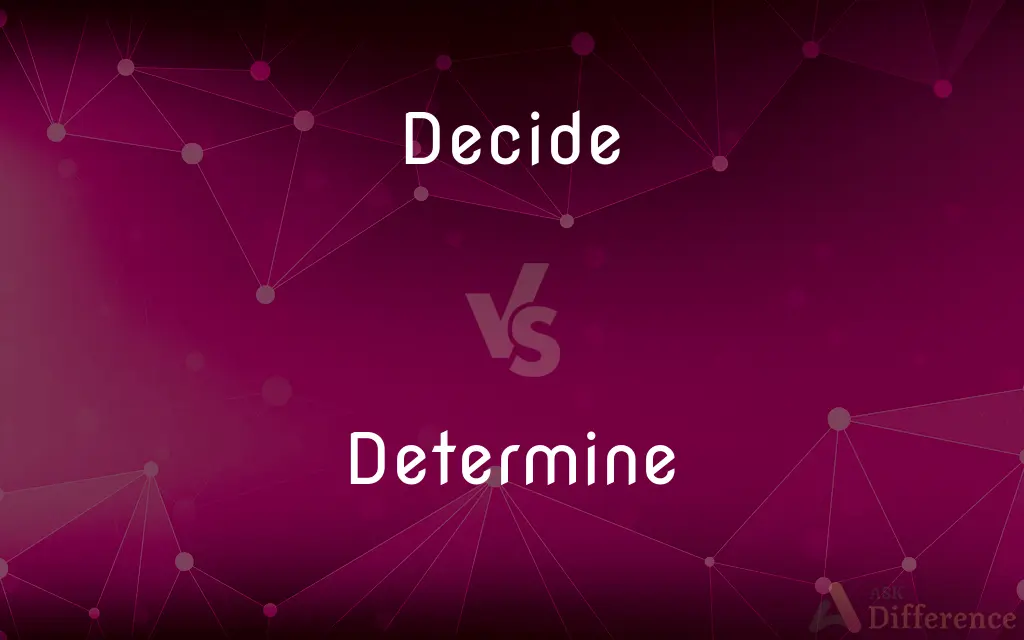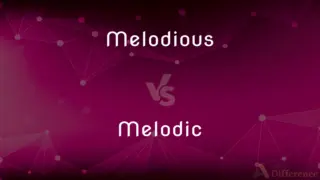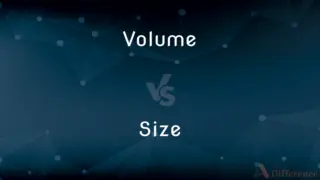Decide vs. Determine — What's the Difference?
Edited by Tayyaba Rehman — By Urooj Arif — Updated on March 24, 2024
Decide involves making a choice among options, focusing on the act of selection, whereas determine entails establishing facts or conclusions, often through analysis or investigation.

Difference Between Decide and Determine
Table of Contents
ADVERTISEMENT
Key Differences
Decide is the process of choosing between two or more options or paths, often based on personal judgment or preferences. It implies a conclusion or resolution has been reached in a situation of uncertainty. Whereas, determine involves the act of conclusively establishing the facts, truth, or conclusions of a matter, often through careful analysis, investigation, or calculation. It suggests a more analytical approach to reaching a conclusion.
When one decides, the emphasis is on the selection process, reflecting a moment of choice that is influenced by various factors including personal values, the perceived pros and cons of the options, and sometimes external pressures. On the other hand, to determine something usually requires a systematic approach to ascertain the specifics of a situation or to establish the truth based on evidence and reasoning.
Decision-making often involves a degree of subjectivity, as individuals rely on their beliefs, experiences, and emotions to choose between alternatives. Whereas, determining is typically more objective, grounded in empirical evidence and logical reasoning to arrive at a factual conclusion.
The context in which "decide" and "determine" are used also differs; decisions are commonly made in personal, business, and political contexts where options are weighed and choices made. In contrast, determine is frequently used in scientific, legal, and investigative scenarios, where precision and factual accuracy are paramount.
Deciding is about making choices that reflect personal or collective preferences and judgments, while determining is about arriving at conclusions through a process of analysis and evidence gathering. Both are crucial in different contexts and serve distinct purposes in problem-solving and understanding the world.
ADVERTISEMENT
Comparison Chart
Focus
Choosing among options
Establishing facts or conclusions
Process
Influenced by personal judgment and preferences
Involves analysis, investigation, or calculation
Subjectivity
More subjective, involves personal or collective preferences
More objective, based on empirical evidence and logic
Common Contexts
Personal, business, political decisions
Scientific, legal, investigative findings
Outcome
Results in a selection or choice
Leads to factual conclusions or establishment of truth
Compare with Definitions
Decide
To settle or conclude a plan or agreement.
They finally decided on a wedding date.
Determine
To officially establish something after calculation, investigation, or analysis.
The study determined the cause of the outbreak.
Decide
To make a choice from a number of alternatives.
She decided to take the job offer in New York.
Determine
To come to a decision or conclusion about something.
The committee will determine the policy changes.
Decide
To come to a resolution in the mind as a result of consideration.
After much thought, he decided against the trip.
Determine
To fix or settle a decision or course of action.
He determined to start his business this year.
Decide
To influence the outcome of something.
Her vote could decide the election.
Determine
To limit, bound, or define something.
The river's path is determined by the landscape.
Decide
To resolve or conclude a question or dispute.
The jury decides the fate of the defendant.
Determine
To cause something to occur in a particular way.
Genetics determine a person's eye color.
Decide
To reach a conclusion or form a judgment or opinion about (something) by reasoning or consideration
Decide what to do.
Determine
Determine (April 7, 1951 – September 27, 1972), was an American Thoroughbred race horse. In a racing career which lasted from 1953 through 1955, the California-trained colt ran forty-four times and won eighteen races.
Decide
To cause to make or reach a decision
"The presence of so many witnesses decided him at once to flee" (Robert Louis Stevenson).
Determine
Cause (something) to occur in a particular way or to have a particular nature
It will be her mental attitude that determines her future
Decide
To settle conclusively all contention or uncertainty about
Decide a case.
Decided the dispute in favor of the workers.
Determine
Firmly decide
My wife had determined that I must swap my old bike for a car
She determined to tackle Stephen the next day
He determined on a withdrawal of his forces
Decide
To influence or determine the outcome of
A few votes decided the election.
Determine
Bring or come to an end.
Decide
To pronounce a judgment; announce a verdict.
Determine
To establish or ascertain definitely, as after consideration, investigation, or calculation
Determined the easiest way to reach the summit.
Decide
To reach a decision; make up one's mind.
Determine
To give direction to by making decisions; devise or control
The school board determines educational policy.
Decide
(ambitransitive) to resolve (a contest, problem, dispute, etc.); to choose, determine, or settle
The election will be decided on foreign policies.
We must decide our next move.
Her last-minute goal decided the game.
Determine
To decide or settle (a dispute, for example) conclusively and authoritatively.
Decide
(intransitive) to make a judgment, especially after deliberation
You must decide between good and evil.
I have decided that it is healthier to walk to work.
Determine
To cause (someone) to come to a decision or resolution
"It was the discovery ... of this very project of hers, which determined him to come forward at once, own it all to his uncle" (Jane Austen).
Decide
(transitive) to cause someone to come to a decision
Determine
To be the cause of; bring about a result regarding
The genes that determine eye color.
Decide
(obsolete) to cut off; to separate
Determine
(Mathematics) To fix or define the position, form, or configuration of.
Decide
To cut off; to separate.
Our seat denies us traffic here;The sea, too near, decides us from the rest.
Determine
(Logic) To explain or limit by adding differences.
Decide
To bring to a termination, as a question, controversy, struggle, by giving the victory to one side or party; to render judgment concerning; to determine; to settle.
So shall thy judgment be; thyself hast decided it.
The quarrel toucheth none but us alone;Betwixt ourselves let us decide it then.
Determine
(Archaic) To put an end to legally; terminate under the law.
Decide
To determine; to form a definite opinion; to come to a conclusion; to give decision; as, the court decided in favor of the defendant.
Who shall decide, when doctors disagree?
Determine
To reach a decision; resolve
Determined to become a better pilot.
Determined on a course of treatment.
Decide
Reach, make, or come to a decision about something;
We finally decided after lengthy deliberations
Determine
(Archaic) To come to an end through legal means.
Decide
Bring to an end; settle conclusively;
The case was decided
The judge decided the case in favor of the plaintiff
The father adjudicated when the sons were quarreling over their inheritance
Determine
To set the boundaries or limits of.
Decide
Cause to decide;
This new development finally decided me!
Determine
To ascertain definitely; to figure out, find out, or conclude by analyzing, calculating, or investigating.
Decide
Influence or determine;
The vote in New Hampshire often decides the outcome of the Presidential election
Determine
To fix the form or character of; to shape; to prescribe imperatively; to regulate; to settle.
Determine
To fix the course of; to impel and direct; with a remoter object preceded by to.
Determine
To bring to a conclusion, as a question or controversy; to settle authoritative or judicial sentence; to decide.
The court has determined the cause.
Determine
To resolve (to do something); to establish a fixed intention; to cause (something) to come to a conclusion or decision; to lead.
I determined to go home at once.
Determine
(logic) To define or limit by adding a differentia.
Determine
To bring to an end; to finish.
Determine
To fix the boundaries of; to mark off and separate.
[God] hath determined the times before appointed.
Determine
To set bounds to; to fix the determination of; to limit; to bound; to bring to an end; to finish.
The knowledge of men hitherto hath been determined by the view or sight.
Now, where is he that will not stay so longTill his friend sickness hath determined me?
Determine
To fix the form or character of; to shape; to prescribe imperatively; to regulate; to settle.
The character of the soul is determined by the character of its God.
Something divinely beautiful . . . that at some time or other might influence or even determine her course of life.
Determine
To fix the course of; to impel and direct; - with a remoter object preceded by to; as, another's will determined me to this course.
Determine
To ascertain definitely; to find out the specific character or name of; to assign to its true place in a system; as, to determine an unknown or a newly discovered plant or its name.
Determine
To bring to a conclusion, as a question or controversy; to settle authoritative or judicial sentence; to decide; as, the court has determined the cause.
Determine
To resolve on; to have a fixed intention of; also, to cause to come to a conclusion or decision; to lead; as, this determined him to go immediately.
Determine
To define or limit by adding a differentia.
Determine
To ascertain the presence, quantity, or amount of; as, to determine the parallax; to determine the salt in sea water.
Determine
To come to an end; to end; to terminate.
He who has vented a pernicious doctrine or published an ill book must know that his life determine not together.
Estates may determine on future contingencies.
Determine
To come to a decision; to decide; to resolve; - often with on.
He shall pay as the judges determine.
Determine
After a calculation, investigation, experiment, survey, or study;
Find the product of two numbers
The physicist who found the elusive particle won the Nobel Prize
Determine
Shape or influence; give direction to;
Experience often determines ability
Mold public opinion
Determine
Fix conclusively or authoritatively;
Set the rules
Determine
Decide upon or fix definitely;
Fix the variables
Specify the parameters
Determine
Reach, make, or come to a decision about something;
We finally decided after lengthy deliberations
Determine
Fix in scope; fix the boundaries of; the tree determines the border of the property
Determine
Settle conclusively; come to terms;
We finally settled the argument
Determine
Find out, learn, or determine with certainty, usually by making an inquiry or other effort;
I want to see whether she speaks French
See whether it works
Find out if he speaks Russian
Check whether the train leaves on time
Common Curiosities
What does it mean to decide on something?
To decide on something means to make a choice or come to a conclusion among various options.
Can decide and determine be used interchangeably?
While they can sometimes be used in similar contexts, they are not interchangeable as "decide" emphasizes choice, and "determine" emphasizes establishing facts or conclusions.
What is the difference between determining a fact and making a decision?
Determining a fact involves establishing truth through analysis, whereas making a decision involves selecting among options based on judgment.
How does personal bias impact decision-making?
Personal bias can skew decision-making, leading to choices that may not be entirely rational or objective.
Can emotions affect decision-making?
Yes, emotions can significantly influence the decision-making process, affecting choices and judgments.
How do you use determine in a sentence?
You use determine in a sentence to imply establishing facts or reaching conclusions through analysis, e.g., "The experiment will determine the chemical's properties."
Does determine always require evidence?
Typically, yes, determining something usually requires evidence or analysis to establish facts or conclusions.
Is determining the same as proving?
Determining involves establishing facts or truths, which can include proving, but proving specifically refers to demonstrating truth through evidence.
Do all decisions require deep thought?
Not all decisions require deep thought; some can be made quickly or based on intuition.
Is deciding always a conscious process?
Yes, deciding is a conscious process involving thought and judgment to choose between alternatives.
Is it possible to determine the outcome of an event?
It is possible to predict or influence the outcome of an event based on factors and analysis, but certainty can be elusive due to variables.
Can decisions be changed once made?
Yes, decisions can often be revisited and changed based on new information or changing circumstances.
How important is accuracy when determining something?
Accuracy is critical when determining something, as it ensures that conclusions or established facts are correct and reliable.
What role does logic play in determining facts?
Logic plays a crucial role in determining facts, providing a structured way to analyze information and reach conclusions.
Can everyone make decisions in the same way?
No, decision-making varies among individuals, influenced by personal experiences, information available, and cognitive biases.
Share Your Discovery

Previous Comparison
Melodious vs. Melodic
Next Comparison
Volume vs. SizeAuthor Spotlight
Written by
Urooj ArifUrooj is a skilled content writer at Ask Difference, known for her exceptional ability to simplify complex topics into engaging and informative content. With a passion for research and a flair for clear, concise writing, she consistently delivers articles that resonate with our diverse audience.
Edited by
Tayyaba RehmanTayyaba Rehman is a distinguished writer, currently serving as a primary contributor to askdifference.com. As a researcher in semantics and etymology, Tayyaba's passion for the complexity of languages and their distinctions has found a perfect home on the platform. Tayyaba delves into the intricacies of language, distinguishing between commonly confused words and phrases, thereby providing clarity for readers worldwide.















































